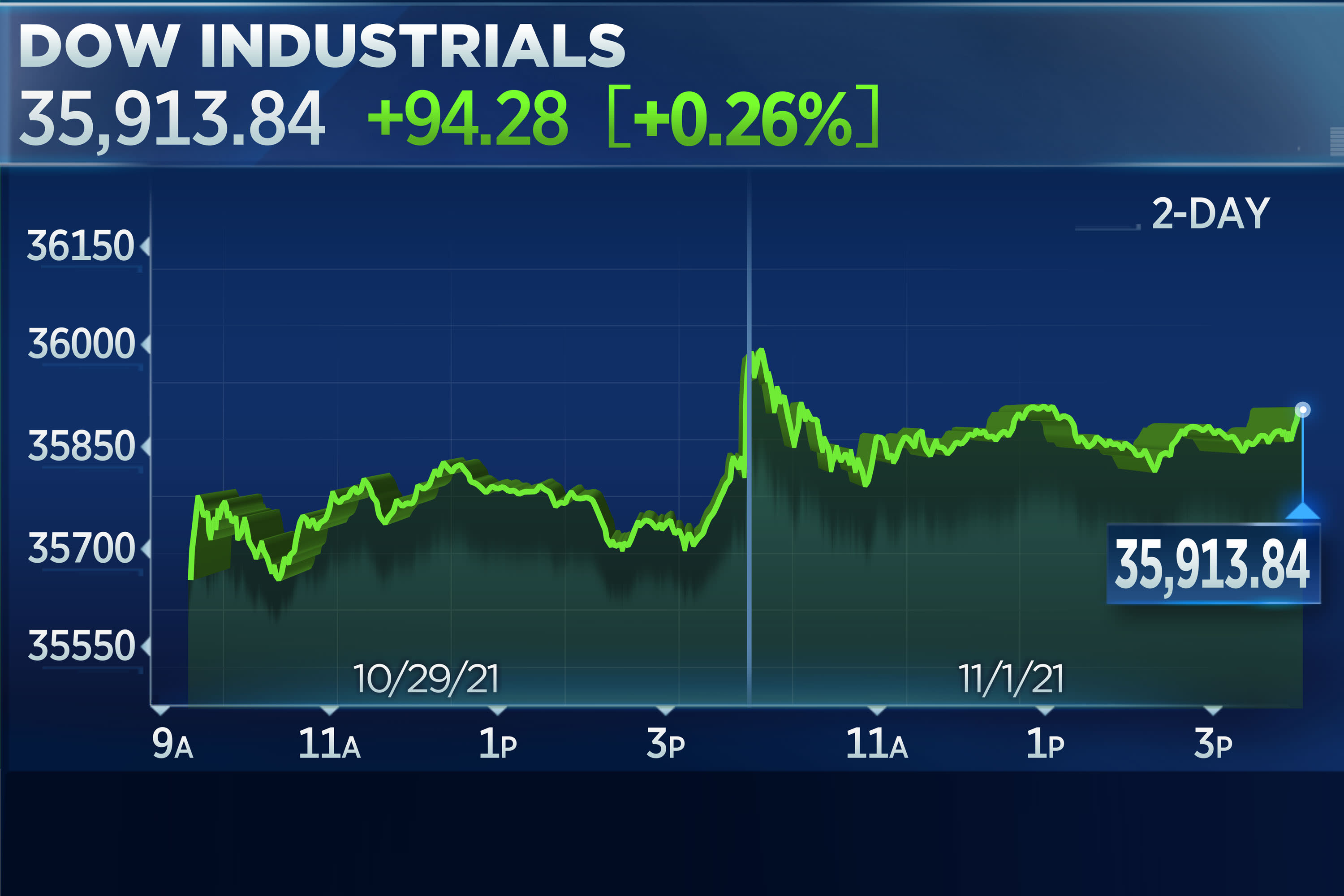Dow and S&P 500 close at records to start November, small caps post best day since August

Stocks rose slightly to new records on Monday — the first trading day of November — after markets emerged from a historically tough seasonal period successfully.
The Dow Jones Industrial Average rose 94.28 points to 35,913.84, helped by gains in Boeing and Dow Inc., closing at a fresh record. The S&P 500 rose nearly 0.2% to 4,613.67, closing at an all-time high. The tech-focused Nasdaq Composite added 0.6% to 15,595.92 and also hit a closing record.
The small-cap benchmark Russell 2000 rallied 2.6% for its best day since Aug. 27.
Tesla, which became a $1 trillion company last week, continued its gains for the year with shares up nearly 8.5%. Investors have been piling into bets on Tesla options as of late.
Stocks linked to an economic recovery, such as Ford and Occidental Petroleum, were also higher. Ford gained 5% and Occidental Petroleum popped 3.8%. Airlines and retailers were mostly in the green, while mega-cap tech stocks underperformed.
“In our view, the key story arc driving equities is the strengthening global recovery,” wrote Fundstrat’s Tom Lee in a note to clients. “COVID-19 trends are improving, but with vaccinations and boosters, the improvement in health care risk could materially accelerate in 2022.”
After a tough September in which the S&P 500 fell more than 4%, the benchmark jumped nearly 7% last month. September is typically the worst month for the market, averaging a 0.4% decline since 1950, according to the Stock Trader’s Almanac. The market typically averages a gain in October, but the month is known for notable crashes so investors were a bit wary as the month began.
But stocks ended up closing out October on Friday with all three major averages closing at record highs. The S&P 500 and Nasdaq clinched their best months since November 2020.
The Dow Jones Industrial Average rose 5.8% in October. The S&P 500 rallied 6.9% last month and the technology-focused Nasdaq Composite added nearly 7.3% in October.
For the year, the S&P 500 is up more than 22%.
In past years when the S&P 500 is up more than 20% in the first ten months of the year, performance in November and for the remainder of the year was positive every time, according to Bespoke Investment Group.
Corporate earnings season dominated October amid solid profit results even with global supply chain concerns. About half of the S&P 500 companies have reported quarterly results and more than 80% of them beat earnings estimates from Wall Street analysts, according to Refinitiv.
Market participants are gearing up for another week of corporate earnings, a key Federal Reserve meeting and October’s jobs report.
Investors will also be monitoring the Federal Reserve’s two-day meeting Tuesday and Wednesday. The central bank is widely expected to announce that it will begin to unwind its $120 billion in monthly bond purchases and end the program entirely by the middle of next year.
Investors will also be looking for the Fed’s comments on rising prices as inflation has been running at a 30-year high.
“The Fed is part of a global move to remove accommodation, and the market drives right past that,” Bleakley Advisory Group CIO Peter Boockvar said. “In a way, the stock market is playing a game of chicken, with this inflation move and interest rates and the response from central banks.”
October’s Institute for Supply Management’s manufacturing index fell to 60.8 from September’s 61.1. Economists were expecting the index to fall to 60.3. Any number above 50 is considered expansion.
The other big event for the week will be October’s employment report Friday, which could show some improvement in hiring, as new cases of Covid-19 continued to decline.
“Key to the report will be how much wage inflation rises and whether the labor force participation rate finally picks up after so many recently came of extended unemployment benefits,” said Jim Paulsen, chief investment strategist for the Leuthold Group.
—CNBC’s Hannah Miao and Patti Domm contributed to this report.




